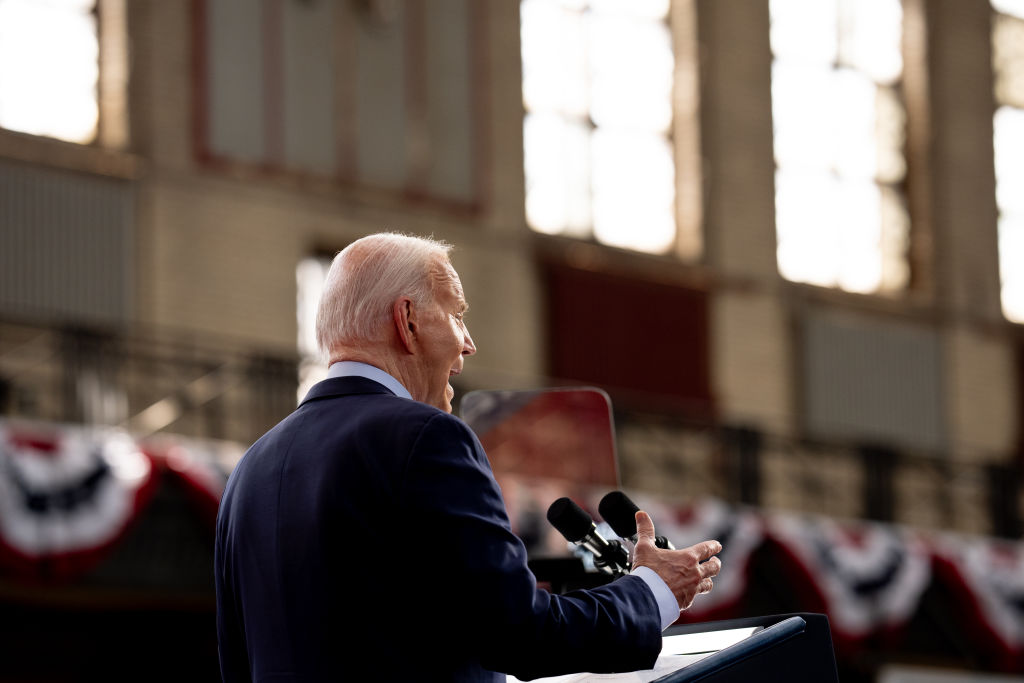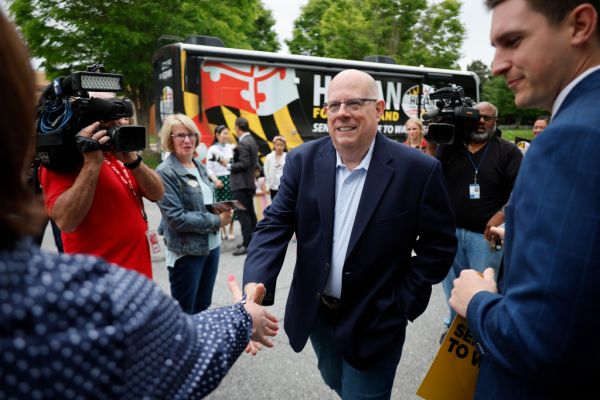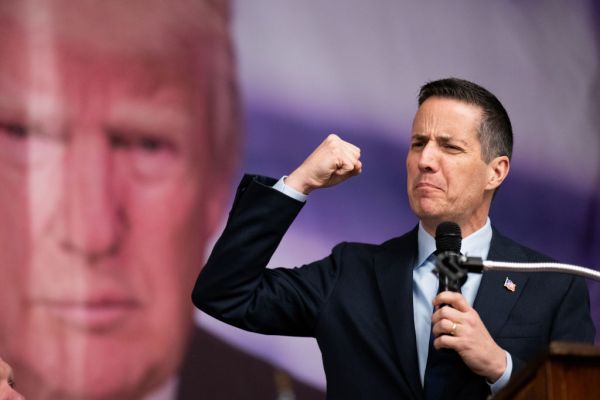Happy Monday! We hope all the dads out there had a happy Father’s Day. We’d like to give our condolences to former GOP presidential candidate Nikki Haley, who lost her father yesterday morning.
Up to Speed
- President Joe Biden raised $30 million at a California fundraiser Saturday that featured former President Barack Obama and several Hollywood stars, his campaign said. Celebrities such as George Clooney, Julia Roberts, and Barbra Streisand all made appearances at the event, which broke a record for a single Democratic fundraiser. Biden and the Democrats had a significant fundraising advantage earlier in the campaign, but former President Donald Trump has made serious gains in the wake of the guilty verdict in his hush money trial.
- That verdict may not help Trump this fall as much as many pundits have predicted, according to a Monday poll from Politico. Twenty-two percent of respondents in the poll—including 21 percent of political independents—said the conviction would impact the way they plan to vote and that it made them less likely to vote for Trump. At the same time, though they do not represent the lion’s share of respondents, a significant number of Americans (32 percent) did not believe the verdict came from a “a fair and impartial judicial process.” What’s more, 43 percent believed prosecutors brought the case to help Joe Biden, compared to 51 percent who did not.
- Biden seeks to capitalize on the political fallout from the verdict, launching a $50 million ad buy set to run in every swing state that attacks Trump for his conviction, Axios reported Sunday. “In the courtroom, we see Donald Trump for who he is,” the ad’s voiceover says. “He’s been convicted of 34 felonies, found liable for sexual assault, and he committed financial fraud.” It goes on to contrast those qualities with Biden’s time in office and asserts that this fall’s election is “between a convicted criminal who’s only out for himself and a president who’s fighting for your family.”
- The Trump and Biden campaigns agreed to rules for their debate on CNN set to take place June 27. The network will mute the candidates’ microphones when they are not speaking during the 90-minute debate, which will have two commercial breaks, during which campaign staff may not interact with the presumptive major-party nominees. Independent candidate Robert F. Kennedy Jr. may qualify for the debate, but it is unlikely, according to the network. Kennedy has reached 15 percent in three of four national polls he needs to qualify, but he is only on enough state ballots to garner 89 electoral votes, well short of the 270 required.
- Rep. Garret Graves, a five-term Republican from Louisiana, announced Friday that he would not seek reelection this fall in the wake of a Supreme Court ruling that allowed a redistricting map that altered his district lines. “It is evident that a run in any temporary district will cause actual permanent damage to Louisiana’s great representation in Congress,” he said in a statement. “Campaigning in any of these districts now is not fair to any of the Louisianians who will inevitably be tossed into yet another district next year.” Graves—whom former Speaker of the House Kevin McCarthy tapped last year to negotiate a debt-ceiling deal with Democrats that President Joe Biden eventually signed into law—joins a spate of House Republicans this term who have resigned or announced they will not run for reelection.
- Elsewhere in Congress, House Freedom Caucus member Rep. Warren Davidson on Sunday endorsed Virginia state Sen. John McGuire, who is challenging caucus chair Rep. Bob Good in a primary Tuesday, Politico reported. While Good has received the support of caucus members like Reps. Chip Roy, Andrew Clyde, and Andy Biggs, former President Donald Trump endorsed McGuire late last month. Multiple members of the Freedom Caucus last week shared their disapproval of Trump’s recent endorsements, complaining that the former president has chosen more moderate candidates over more conservative ones.
Biden Campaign Expands Effort to Win GOP Votes

With a national Republican engagement director on board, President Joe Biden’s campaign is intensifying efforts to woo center-right voters reluctant to pull the lever for presumptive GOP nominee Donald Trump. But don’t expect to see much public evidence of this program before Labor Day.
The Biden campaign launched its bid for disaffected Republicans in early March, soon after Nikki Haley dropped her bid for the GOP presidential nomination. The millions of voters who supported the former South Carolina governor and ex-United States ambassador to the United Nations in Republican primaries were and are the Biden campaign’s targets. Now, with veteran Republican operative Austin Weatherford in place to lead the effort, the president’s team has quietly accelerated the program.
The Biden campaign had already begun message-testing spots that targeted “Haley Republicans” while sketching out an ad and grassroots outreach strategy in battleground state communities that were hostile to Trump in GOP primaries. Campaign sources told Dispatch Politics that Weatherford’s hiring has facilitated next steps. As a GOP operative for 25 years who has made the jump to supporting Biden, he brings credibility and a shared experience to his conversations with dissatisfied Republicans.
“We don’t expect Republican voters to agree with this president 100 percent of the time. That’s normal,” Weatherford told NPR. “What I’m going to be doing is building up the permission for Republican voters to vote for President Biden.” Weatherford was Adam Kinzinger’s chief of staff for 10 of the 12 years the Illinois Republican served in the House of Representatives. Kinzinger, one of the 10 House Republicans who voted to impeach Trump in 2021, was a member of the House Select Committee to Investigate the January 6 attack on the United States Capitol.
The Biden campaign declined to make Weatherford available for comment to Dispatch Politics.
A key aspect of the program Weatherford is overseeing is “timing.”
The Biden campaign believes the effort can be most successful if it pops in the fall, as Americans begin to pay closer attention to the 2024 election—and as early and mail-in voting get underway in various states. It’s then that team Biden is planning—or perhaps hoping—to unveil a collection of endorsements from prominent Republicans, similar to that of Geoff Duncan, Georgia’s former lieutenant governor. Until then, most preparations, carried out by a dedicated GOP outreach staff, are taking place behind the scenes.
However, it might be possible to get a sneak peek of what the Biden campaign has planned by looking out for advertising and grassroots engagement in the swing-state suburbs that will decide the election.
For example, the Biden campaign hopes to pick off Republican primary voters who supported Haley in Wisconsin’s “WOW” counties. In Waukesha, Ozaukee, and Washington, the former Trump Cabinet official finished with 14 percent, 17 percent, and 12 percent of the vote, respectively, versus her old boss. Biden’s team is also targeting the 155,000 voters who backed Haley over Trump in Pennsylvania, who were heavily concentrated in the Philadelphia suburbs.
This approach also applies to:
- The Atlanta suburbs of Georgia. Haley won 40 percent of the primary vote in DeKalb County, 23 percent of the vote in Cobb County, and 38 percent of the vote in Fulton County.
- The Detroit and Grand Rapids suburbs of Michigan. There, Trump underperformed, by the Biden campaign’s estimation, in Oakland, Washtenaw, Ottawa and Kent counties.
- The Charlotte and Raleigh suburbs of North Carolina. There, Haley performed well in Durham, Mecklenburg, Orange, and Wake counties.
Meanwhile, Trump continues to lead Biden in polling averages, both nationally and in the decisive battleground states.
Derrick Anderson and Cameron Hamilton vie for Virginia’s 7th District GOP Primary
An upcoming Republican primary in a closely watched swing district has turned into the latest iteration of intra-GOP fissures.
Two leading candidates have emerged in a crowded field vying for the Republican nomination in Virginia’s 7th Congressional District in Tuesday’s primary. Retired Green Beret Derrick Anderson has the backing of GOP House leadership, while Cameron Hamilton, a retired Navy SEAL, has the support of senior and notable members of the House Freedom Caucus. In 2020, Joe Biden won the district—which stretches from the Washington suburbs to the exurbs of Richmond—by nearly 7 points, before Republican Glenn Youngkin took it by a similar margin in 2021’s gubernatorial election.
Anderson and Hamilton are looking to succeed Rep. Abigail Spanberger, a Democrat who has represented the district for three terms since she defeated incumbent Republican Rep. David Brat in 2018.
An exceedingly competent campaigner, Spanberger won her first two races by less than 2 points and her third term by a little less than 5 points. Last November, she announced her plan to retire and run for governor in 2025, opening up her seat for a presidential-election-year battle. The National Republican Congressional Committee had already listed Spanberger as one of its top targets, and it responded to the news of her gubernatorial run with a declaration that “Republicans will flip this seat.”
But before they can do that, they’ll need to choose a winner in a primary that has become a proxy battle between factions in the party. Speaker of the House Mike Johnson endorsed Anderson—who finished second in the 2022 GOP primary—back in December. Majority Whip Tom Emmer followed suit in March. Meanwhile, Freedom Caucus Chair Rep. Bob Good has endorsed Hamilton, as have Reps. Chip Roy and Byron Donalds.
In an interview with Dispatch Politics, Hamilton attributed leadership’s decision to coalesce around Anderson to the perception that he will be more “malleable” to House leaders’ wishes. Anderson “will essentially be a traditional Republican that will vote in line with what Republican Party leadership will ask for,” Hamilton said.
For his part, Anderson noted the large amount of support he has received from fellow Republicans, specifically naming Republican Conference Chair Elise Stefanik and Rep. Ronny Jackson. Jackson has been reported as an ally of the Freedom Caucus, and retiring Rep. Debbie Lesko, a member of the caucus, has endorsed Anderson as well.
“We’ve been endorsed by a wide range of conservative leaders,” Anderson told Dispatch Politics. “We have a large, big tent of people that are supporting us and, again, that’s what it’s going to take to win in November.”
The most notable policy disagreement between the two candidates deals with Ukraine aid, which has also divided members of House leadership and the Freedom Caucus. While Anderson is open to aiding Ukraine, Hamilton is skeptical and more insistent that border security come first.
In his interview with Dispatch Politics, Hamilton said that foreign aid—not only to Ukraine but also Israel and Taiwan—must come after a deal to secure the southern border. “I’m willing to go toe-to-toe with my own party to say that anything that does not prioritize our southern border right now is almost, by definition, frivolous or is secondary in priority,” he said. He added that he has “a lot of skepticism” about Ukraine aid and less skepticism about such help to Israel.
Anderson said he did not want to send a “blank check” to Ukraine and expressed concerns over whether the type of equipment America was sending is useful to the Ukrainians. But in contrast to Hamilton, he indicated openness to aid concurrent with the pursuit of border security measures. “We’re able to do multiple things at once,” Anderson told Dispatch Politics. “We’re able to support Ukraine. We’re able to support Israel. We’re able to support our allies overseas while, at the same time, support our southern border. But right now, that’s not what we’re seeing the Democrats willing to do.”
The winner of Tuesday’s primary will face the victor of a similarly crowded Democratic primary that features Eugene Vindman, known for his role in the first impeachment saga of former President Donald Trump. Vindman has raised more than $5 million this cycle, dwarfing his Democratic opponents—and surpassing Anderson’s $1.1 million and Hamilton’s $720,000.
Notable and Quotable
“If the president asked me to serve in any capacity, I would, of course, entertain it. But, right now, I’m very happy being a senator representing the people of Arkansas and working to elect President Trump and a majority in the Congress so we can begin to repair some of the damage that Joe Biden and the Democrats inflicted over these last four years.”
—Sen. Tom Cotton in response to a question on CNN’s State of the Union about whether he would say yes if former President Donald Trump asked him to be his running mate, June 16, 2024








Please note that we at The Dispatch hold ourselves, our work, and our commenters to a higher standard than other places on the internet. We welcome comments that foster genuine debate or discussion—including comments critical of us or our work—but responses that include ad hominem attacks on fellow Dispatch members or are intended to stoke fear and anger may be moderated.
With your membership, you only have the ability to comment on The Morning Dispatch articles. Consider upgrading to join the conversation everywhere.